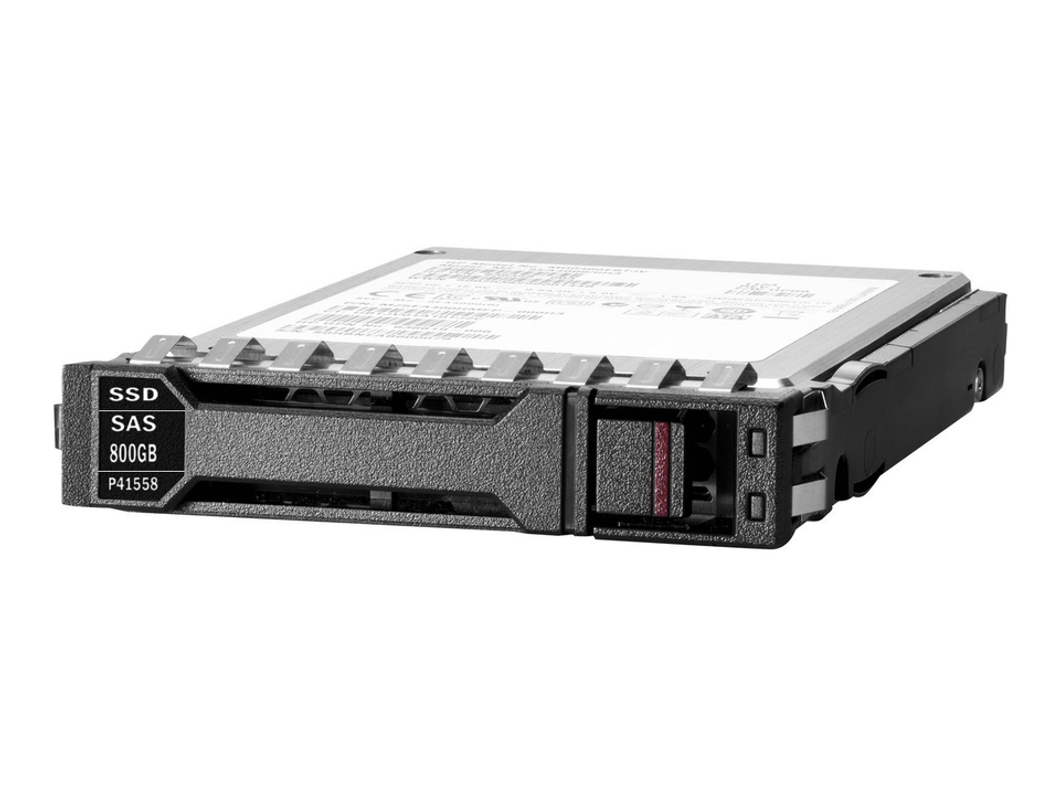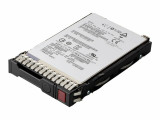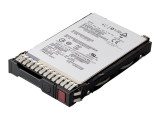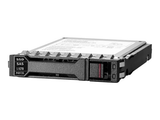HPE 800GB SAS-12Gbps SSD: Powering ProLiant Gen10 Plus Servers with Speed and Security
Overview of the HPE 800GB SAS-12Gbps Mixed Use SSD
The HPE 800GB 2.5-inch Small Form Factor (SFF) Digitally Signed Firmware SAS-12Gbps Basic Carrier Mixed Use Solid State Drive (SSD) is a high-performance storage solution designed specifically for HPE ProLiant Gen10 Plus servers. Engineered to handle mixed-use workloads, this SSD offers a balance of speed, reliability, and security, making it ideal for enterprise environments. Its robust feature set supports demanding applications such as transactional databases, virtualization, and big data analytics. This article provides a comprehensive exploration of the SSD’s specifications, features, benefits, compatibility, and ideal use cases, offering IT professionals and decision-makers valuable insights for optimizing their data center infrastructure.
Purpose and Scope
This article aims to detail the technical specifications, performance metrics, and practical applications of the HPE 800GB SAS-12Gbps SSD, focusing on its role in enhancing ProLiant Gen10 Plus server performance. It also covers compatibility considerations, maintenance best practices, and the strategic advantages of deploying this SSD in enterprise settings.
Technical Specifications
The HPE 800GB SSD is built to deliver enterprise-grade performance and reliability. Below are its key technical specifications:
Hardware Specifications
Interface: SAS-12Gbps, offering high-speed data transfer rates for enterprise applications.
Form Factor: 2.5-inch SFF, optimizing space in high-density server configurations.
NAND Flash Type: Triple-Level Cell (TLC), balancing cost, performance, and endurance.
Capacity: 800GB, suitable for a wide range of enterprise storage needs.
Carrier Type: Basic Carrier (BC), supporting hot-swappable functionality for ease of maintenance.
Height: 15 mm (0.6 inches), ensuring compatibility with standard server bays.
Performance Metrics
Drive Transfer Rate: 12 Gbps (external), providing superior bandwidth compared to SATA drives.
Sequential Read Throughput: Up to 1080 MiB/s, enabling fast data access for read-heavy workloads.
Sequential Write Throughput: Up to 1030 MiB/s, supporting efficient write operations.
Random Read IOPS (4KiB, Q=16): 115,000, ensuring high performance for random access tasks.
Random Write IOPS (4KiB, Q=16): 100,000, delivering consistent write performance.
Maximum Random Read IOPS (4KiB): 175,000 at Q256, ideal for high-demand applications.
Random Read Latency (4KiB, Q1): 165 µs, offering low latency for responsive operations.
Random Write Latency (4KiB, Q1): 95 µs, ensuring quick write operations.
Endurance: 3.0 Drive Writes Per Day (DWPD) over 30 days, with a lifetime write capacity of approximately 4280 TB, suitable for mixed-use workloads.
Power Consumption
Idle Time: 3.58 Watts, contributing to energy efficiency in data centers.
Random Read/Write: 5.99 Watts, maintaining efficiency during active operations.
Sequential Read: 6.47 Watts, optimized for read-intensive tasks.
Sequential Write: 9.84 Watts, supporting high-performance write operations.
Key Features
The HPE 800GB SSD incorporates advanced features that enhance its performance, security, and manageability in enterprise environments.
Digitally Signed Firmware
The SSD features Digitally Signed Firmware (DS), which ensures authenticity and protects against unauthorized firmware modifications. This is critical for organizations with strict compliance and security requirements, safeguarding data integrity and system reliability.
Basic Carrier Design
The Basic Carrier (BC) design supports hot-swappable functionality, allowing drives to be replaced without powering down the server. This minimizes downtime and simplifies maintenance, making it ideal for 24/7 enterprise operations. The carrier includes LED indicators for real-time drive status monitoring, enhancing operational efficiency.
Power Loss Protection
Equipped with Power Loss Protection (PLP), the SSD uses onboard capacitors to preserve data in flight during sudden power failures, writing it to non-volatile memory. This feature ensures data integrity, which is essential for mission-critical applications.
High-Performance SAS-12Gbps Interface
The SAS-12Gbps interface provides twice the bandwidth of SATA-6Gbps drives, delivering faster data transfers and lower latency. This makes the SSD well-suited for high-throughput workloads such as databases and virtualization.
HPE SmartSSD Wear Gauge
The SSD integrates with HPE’s SmartSSD Wear Gauge, allowing IT administrators to monitor drive lifespan and predict potential failures. This proactive maintenance tool helps minimize disruptions and optimize replacement schedules.
Compatibility with HPE ProLiant Gen10 Plus Servers
The HPE 800GB SSD is designed for seamless integration with HPE ProLiant Gen10 Plus servers, ensuring optimized performance and reliability. Below is a non-exhaustive list of compatible models:
HPE ProLiant ML Series: ML30 Gen10 Plus, ML30 Gen10 Plus Entry, ML30 Gen10 Plus Performance (2.5-inch).
Compatibility Considerations
Firmware Updates: Ensure the server’s firmware and RAID controller are updated to support the SSD. Consult HPE’s documentation for specific requirements.
RAID Controller: Verify compatibility with the server’s RAID controller to ensure optimal performance.
HPE Synergy Support: The SSD is compatible with HPE Synergy systems, making it suitable for converged infrastructure environments.
IT administrators should contact their vendor or refer to HPE’s official compatibility matrix to confirm support for specific server configurations.
Benefits for Enterprise Environments
The HPE 800GB SAS-12Gbps SSD offers several advantages that make it a strategic choice for enterprise storage upgrades.
Enhanced Performance
With high IOPS (up to 175,000 for random reads) and low latency (as low as 95 µs for writes), the SSD excels in mixed-use workloads, delivering consistent performance for transactional databases, virtualization, and analytics. Its SAS-12Gbps interface ensures faster data transfers compared to SATA drives, reducing bottlenecks and improving system responsiveness.
Improved Reliability
Backed by over 3.35 million hours of testing and qualification, HPE’s Mixed Use SSDs are engineered for reliability. Features like Power Loss Protection and Digitally Signed Firmware enhance data integrity and security, minimizing the risk of data loss or unauthorized access.
Energy Efficiency
The SSD’s low power consumption (as low as 3.58 Watts at idle) contributes to reduced operational costs in data centers, making it an environmentally and financially sustainable choice.
Simplified Maintenance
The Basic Carrier design and integration with HPE’s Integrated Lights-Out (iLO) tools enable real-time health monitoring and predictive analytics, reducing downtime and simplifying drive management. The hot-swappable functionality further enhances operational efficiency.
Ideal Use Cases
The HPE 800GB SSD is tailored for enterprise applications requiring a balance of read and write performance. Key use cases include:
Transactional Databases
The SSD’s high random IOPS and low latency make it ideal for transactional databases used in e-commerce, financial services, or ERP systems, ensuring fast query execution and reliable data access under heavy workloads.
Virtualization
For virtualization platforms like VMware or Hyper-V, the SSD’s balanced performance supports multiple virtual machines, delivering consistent speed and reliability for virtual desktop infrastructure (VDI) and server consolidation.
Big Data Analytics
The SSD’s high throughput and scalability are well-suited for big data analytics, enabling rapid processing of large datasets and supporting the read/write demands of analytics workloads.
High-Performance Computing (HPC)
In HPC environments, the SSD’s SAS-12Gbps interface and high IOPS provide the performance needed for compute-intensive tasks, such as simulations, modeling, and scientific research.
Best Practices for Deployment and Maintenance
To maximize the performance and lifespan of the HPE 800GB SSD, consider the following best practices:
Health Monitoring
Utilize HPE iLO and Basic Carrier indicators to monitor drive health and performance in real time, enabling proactive maintenance.
Firmware Updates
Regularly apply HPE-provided firmware updates to maintain security, compatibility, and optimal performance.
Predictive Analytics
Leverage HPE’s SmartSSD Wear Gauge to schedule drive replacements before failures occur, minimizing disruptions.
Conclusion
The HPE 800GB 2.5-inch SFF Digitally Signed Firmware SAS-12Gbps Basic Carrier Mixed Use SSD is a powerful and reliable storage solution for HPE ProLiant Gen10 Plus servers. Its high-performance SAS-12Gbps interface, advanced features like Power Loss Protection and Digitally Signed Firmware, and compatibility with modern server architectures make it an ideal choice for enterprise workloads. Whether deployed in transactional databases, virtualization platforms, big data analytics, or HPC environments, this SSD delivers exceptional speed, reliability, and manageability. By following best practices for deployment and maintenance, IT administrators can ensure optimal performance and longevity, making the HPE 800GB SSD a strategic investment for modern data centers.
Recent Posts
-
Enterprise Performance Redefined: HPE P37011-B21 1.92TB SAS Mixed Use SSD for ProLiant Gen9 and Gen10 Servers
HPE P37011-B21 1.92TB SAS SSD for ProLiant Gen9 and Gen10 Servers The HPE P37011-B21 1.92TB 2.5inch …Jan 20th 2026 -
Power, Performance, and Precision: HPE 1.92TB SAS SSD for Gen10 Servers
HPE 1.92TB 2.5-inch SFF Digitally Signed Firmware SAS-12Gbps Smart Carrier Mixed Use Value SAS Solid …Jan 19th 2026 -
HPE 1.92TB 2.5" SAS-24Gbps SSD: High-Speed Read Intensive Storage for Gen10 Plus Servers
HPE 1.92TB 2.5inch SFF SAS-24Gbps Read Intensive SSD for ProLiant Gen10 Plus Servers The HPE 1.92TB …Jan 18th 2026




